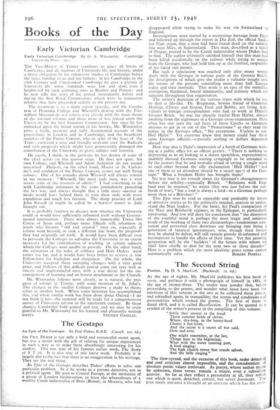Books of the Day
Early Victorian Cambridge
THE Vice-Master of Trinity continues to place all lovers of Cambridge, and all students of University life and history, under a heavy obligation by his exhaustive studies of Cambridge before the times familiar to us and our fathers: in his Cambridge in the 18th Century and Unreformed Cambridge he gave a picture of University life when standards were low and slow, even if
brightened by such glittering stars as Bentley and Porson: and he now tells the story of the period immediately before and during the first Royal Commissions which were to inaugurate reforms that have proceeded orderly to the present day.
The treatment is to a slight extent episodic, and the founda- tion of Downing College and Whewell's dealing with the Fitz-
william Museum do not cohere very closely with the main theme of the internal reforms and those more or less forced upon the University by the first Statutory Commission: but once he has embarked upon the broad stream of his history, Mr. Winstanley gives a lively, accurate and fully documented account of the proceedings in London and in Cambridge, and the beneficent activities of the Prime Consort, who in spite of the fears of the Tories, exercised a wise and friendly restraint over the Radicals and rash proposals which might have permanently damaged the contribution of the University to piety, culture and learning.
He excels, I think, in the portraits he has drawn of some of the chief actors on this narrow stage. He does not spare his own College, and Whewell and Adam Sedgwick do not escape unscathed. Philpott, on the other hand, Master of St. Cathar- inc's and confidant of the Prince Consort, comes out with flying colours. One of his remarks about Whewell will always remain in my memory : " Whewell, like most rude men, was a very severe critic of the manners of others." I had something to do with Cambridge reformers in the years immediately preceding the last war, and always thought that a little more suaviter in modo would have helped them to gain their ends with more expedition and much less friction. The sharp practice of Lord John Russell (it might be called by a harsh'r name) is duly brought out.
It is probably fruitless to discuss now whether the University could or would have sufficiently reformed itself without Govern- mental intervention. There were always immovable Tories like Corrie of Jesus and, perhaps more difficult still, reformers in youth who became " old and crusted " later on, especially if reform went beyond, or took a different line from, the proposals they had originally set forth. It would have been difficult ever to persuade the Colleges to subsidise the University to an extent necessary for the centralisation of teaching in certain subjects which the Colleges were unable to provide. On the other hand, the relaxation of the rules of celibacy and Holy Orders went rather too far, and it would have been better to reserve a few. Fellowships for bachelors and clergymen. On the whole, the University accepted these sweeping changes with a very good grace, and Fellows of this difficult period come out very well as sincere and single-minded men, with a true desire for the en- couragement of learning and an honest attachment to the Church.
Mr. Winstanley follows most closely, as is natural, the pro- gress of reform in Trinity, with some mention of St. John's. The changes in the smaller Colleges deserve a study to them- selves in another book. When some historian has accomplished this, and when similar work has been done about Oxford—I do not think it has—the material will be ready for a comprehensive survey of University reform in the nineteenth century. By these changes Cambridge both gained and lost, and we may be truly grateful to Mr. Winstanley for his learned and pleasantly written






























 Previous page
Previous page